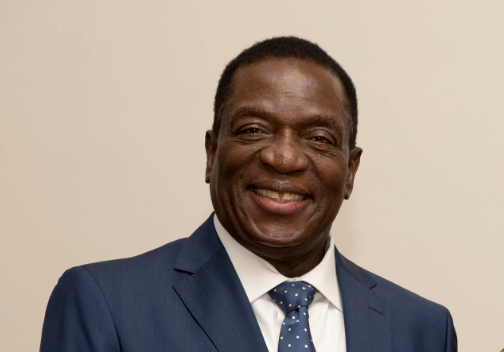
After a bloodless coup and a transfer of power from one Zanu-PF veteran to another, things are settling down in Zimbabwe. Emmerson Mnangagwa’s inauguration as the third president of Zimbabwe last Friday at the national stadium in Harare sealed the end of Robert Mugabe’s despotic rule. But it’s uncertain what the dramatic developments will mean for democracy in the country.
Significantly, Mugabe, who regularly attended African head of state inaugurations, was conspicuous by his absence. The president of Zambia, Edgar Lunga, was flanked by his country’s founding president, Kenneth Kaunda, who had arrived in Zimbabwe before Mugabe’s resignation and is believed to have played a significant role in persuading him to resign. Also present were Botswana’s leader, Ian Khama; Mozambique’s president, Filipe Nyusi; and two former presidents of Namibia. Prominent no-shows were South Africa’s president, Jacob Zuma, and the new Angolan president, Joao Lourenco. Great Britain sent a junior minister to the ceremony. North Korea sent its congratulations.
In a sign that could possibly herald a new era, opposition leaders were invited to the inauguration ceremony. Morgan Tsvangirai, president of MDC–T, the largest opposition party in Zimbabwe, was greeted with rapturous applause as he arrived at the packed stadium. After reciting the oath of office, Mnangagwa received salutes and pledges of allegiance from the generals to tumultuous applause. But police commissioner Augustine Chihuri, who is seen as the leading supporter of the faction that backed Grace Mugabe, was loudly booed. War veterans have already asked for his resignation.
Mnangagwa’s speech was crafted with the international community in mind. He began by declaring that the land reform exercise wouldn’t be reversed, which surprisingly elicited no reaction from the crowd. He pledged that his government would compensate white farmers whose land had been seized and implement a land audit—programs that were mandated by the former government of national unity. Mnangagwa also promised to protect international investments and to re-engage with the international community.
On the same day as the inauguration, Zimbabwe’s High Court ruled that the military action leading to Mugabe’s resignation was legal. High Court Judge George Chiweshe
found that the military, ‘“in intervening to stop the takeover of Mugabe’s constitutional functions[,]” … ensured that non-elected individuals do not exercise executive functions’—a thinly veiled reference to former first lady Grace Mugabe. Judge Chiweshe also declared Mugabe’s firing of Mnangagwa as vice president illegal.
As reported by AP/Reuters, former minister of higher education Jonathan Moyo, one of Mugabe’s closest allies, tweeted, ‘If these breathtaking High Court Orders granted in Harare yesterday represent what is being peddled as a “new path”, then please pray for Zimbabwe’. And the southern Africa director for Human Rights Watch, Dewa Mavhinga, called the rulings ‘incredible’, declaring on Twitter: ‘Strange, captured judiciary?’
Mnangagwa is hardly a breath of fresh air. Nicknamed ‘the Crocodile’, he’s known for his ruthlessness and has been accused of overseeing ethnic massacres and political violence. The long-time Robert Mugabe ally made his first public comments in his new role last Wednesday in front of the ruling party headquarters. Towards the end of his speech, he changed from English to the vernacular, saying in Shona, ‘
Vanenge vasingadi, vachagara vachingovukura, chitima cheZanu-PF chichingoinda, chichingoinda, muchingotonga, muchingotonga, vachingovukura’ (‘Zanu-PF will continue ruling no matter what, while those who oppose it will continue barking’).
What kind of political system will emerge under Mnangagwa is anybody’s guess. It’s important to remember that Mnangagwa is an interim president who must steer the country towards free and fair elections. He has never won an election, and it remains to be seen whether he can win against a united opposition and effectively lead a fractured Zanu-PF party that has had serious purges within its ranks.
The political discourse in Harare suggests that two distinct camps are emerging—those who want elections to be held very soon, and those who say the polls should be postponed and a transitional government established. Contrary to popular sentiment that the coup in Zimbabwe would usher in a new era of democracy, the military intervention was much more about a succession crisis in Zanu-PF.
David Monyae, co-director at the University of the Confucius Institute at the University of Johannesburg South Africa
argues that elite pacts or high-level negotiation settlements are a recurrent theme in southern African history, especially in the settler colonies of South Africa, Kenya and Rhodesia/Zimbabwe. ‘The key failure in the international community has been in understanding this elite pact’, he says.
In Zimbabwe, the elite pact has been between the military and Zanu-PF. Now the international community must focus on the institutions and levers for democracy and not on the individual. Two UN independent experts, for example,
have already called for sanctions to be lifted. This is premature. It would be a mistake to focus on Mnangagwa and not on the constitutional processes towards implementing an environment for free and fair elections.
Zimbabwe isn’t celebrating a new era: it’s celebrating the removal of Mugabe, a dictator. It is now critical that the international community insist on the full enactment of the new constitution
approved in the 2013 referendum, together with a reversal of Mugabe’s draconian policies.
 Print This Post
Print This Post